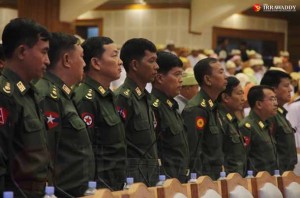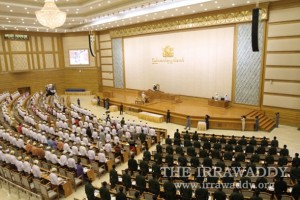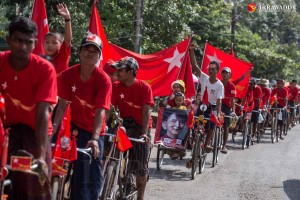Posts Tagged ‘National League for Democracy’ (266 found)
Time for a Fresh Start for Genuine Peace
 Between 12-16 January, 2015, the ‘Union Peace Conference’ was held with over 700 representatives of the Burma Government, signatories of the Nationwide Ceasefire Agreement (NCA), Members of Parliament, political parties and other invitees in Naypyidaw […]
Between 12-16 January, 2015, the ‘Union Peace Conference’ was held with over 700 representatives of the Burma Government, signatories of the Nationwide Ceasefire Agreement (NCA), Members of Parliament, political parties and other invitees in Naypyidaw […]
New Report Exposes Systematic Cover-up of Myanmar Army Involvement in Kachin Rape-Murder Case
A new report exposes the systematic cover-up of the Myanmar Army’s involvement in the rape-murder of two Kachin teachers in Kawng Kha village, northern Shan State, exactly one year ago […]
• • •Myanmar: One Year On, No Justice for Kawng Kha Rape
(Yangon, January 19, 2016) – Myanmar authorities should allow an independent investigation into the rape and killing of two Kachin women from Kawng Kha Village, Northern Shan State, Civil Rights Defenders said today […]
• • •Burma: Growing Political Prisoner Population
(Bangkok) – Burmese authorities should immediately drop all politically motivated charges against hundreds of detainees and unconditionally release them, Human Rights Watch said today. President Thein Sein should fulfill pledges he made over three years ago to free all of the country’s political prisoners […]
• • •No Women, No Peace: Gender Equality, Conflict and Peace in Myanmar
This briefing explores the gender dimensions and gender impact of conflict in Myanmar. Such information is relatively scarce, and there has long been a need for a deeper understanding of the intersections of gender, ethnicity and other identities in peace-building and democratisation […]
• • •Burma Army Moves to Tighten Grip on Power
 While people were still in a buoyant mood over the November 2015 elections results, wrapping up last year’s work and preparing for 2016, the Burma Army and the Government had a clearly different agenda, initiating several discreet moves in an attempt to maintain its grip on power during the term of the future National League for Democracy (NLD) Government […]
While people were still in a buoyant mood over the November 2015 elections results, wrapping up last year’s work and preparing for 2016, the Burma Army and the Government had a clearly different agenda, initiating several discreet moves in an attempt to maintain its grip on power during the term of the future National League for Democracy (NLD) Government […]
Finding on Process of Observing General Election 2015 by Association of Human Rights Defenders and Promoters
(1) Brief presentation – Association of Human Rights Defenders and Promoters in cooperation with allied associations had observed the process of election held on 8th November within the regions of Shan, Rakhine, Kayar, Ayarwady, Yangon, Pao and Danu self administrative regions […]
• • •Victims’ Voices and Healing a Must for Genuine Reconciliation
 Much has been made of the series of meetings between Daw Aung San Suu Kyi and several key individuals after the elections, including the current Commander-in-Chief of the Burma Army, Senior General Min Aung Hlaing. But none generated more headlines than the meeting on 4 December, 2015 with retired Senior General Than Shwe, leader of the former military junta and head of state until 2011, purportedly to discuss and ensure a smooth transition of power.
Much has been made of the series of meetings between Daw Aung San Suu Kyi and several key individuals after the elections, including the current Commander-in-Chief of the Burma Army, Senior General Min Aung Hlaing. But none generated more headlines than the meeting on 4 December, 2015 with retired Senior General Than Shwe, leader of the former military junta and head of state until 2011, purportedly to discuss and ensure a smooth transition of power.
Such meetings, while raising eyebrows, are more than just symbolic and should be read in the context of Burma’s troubled past with elections and power transfer. The emphatic victory at the November 2015 polls was similar to the 1990 elections, which later saw the annulment of the results and extension of power by the military.
Seen in this light, these meetings reveal the complexity of the power transfer, the actors that still wield considerable political capital, and the different interests in directing the transition. It is also fair to infer that a relatively seamless power transfer to the incoming National League for Democracy (NLD) Government can be expected, given the apparent endorsement and pledge of support from senior figures from the previous military regime such as Than Shwe […]
• • •The 2015 General Election in Myanmar: What Now for Ethnic Politics?
Despite huge challenges, election day in Myanmar passed almost entirely peacefully. Aung San Suu Kyi’s National League for Democracy triumphed in polls that were regarded by domestic and international observers as remarkably free from irregularities […]
• • •ICTJ Paper Looks at Range of Options for Dealing with Myanmar’s Troubled Past
YANGON, December 9, 2015—With hopes running high after the National League for Democracy’s landslide victory in November, a new paper by the International Center for Transitional Justice calls on the soon-to-be-established Burmese government to seriously consider taking steps to deal with Myanmar’s troubled past as a wayto help end the cycle of violence and human rights violations in the conflict-torn country […]
• • •








 All posts
All posts